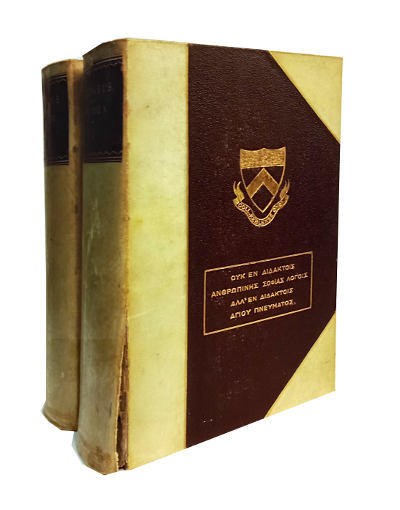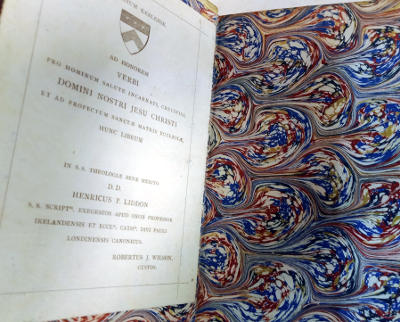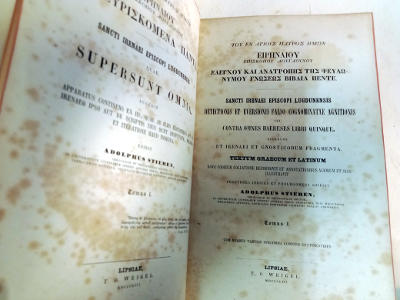Full title in Latin:
Title of set: Sancti Irenaei Episcopi Lugdunensis quae Supersunt Omnia accedit Apparatus Continens ex iis, quae ab Aliis Editoribus aut de Irenaeu ipso aut de Scriptis eius sunt Disputata, Meliora et Iteratione Haud Indigna, edidit Adolphus Stieren
Title of Vol 1: Sancti Irenaei Episcopi Lugdunensis Detectionis et Eversionis Falso Cognominatae Agnitionis seu contra omnes Haereses Libri Quinque accedunt et Irenaei et Gnosticorum Fragmenta. Textus Graecum et Latinum, Nova Codicum Collatione Recognovit et Annotationibus Aliorum et suis Illustravit. Praeterea Indices et Prolegomena Adiecit Adolphus Stieren
Titla of Vol 2: Apparatus ad Opera Sancti Irenaei Episcopi Lugdunensis quo continentur Praefationes et Prolegomena Aliorum Editorum tum Commentationes ad Authentiam Operis Adv. Haer. Pertinentes. tum Scripta Virorum Doctorum quae Spectant ad iv Renae Fragmenta a Christophoro Matthaeo Pfaffio Tubingensi e Laterbris Bibliothecae Tauchinensis Quondam Eruta et Edita, Denique Selectae Aliorum Annotationes ad Irenaei Scripta, adornavit Adolphus Stieren
About the book (from Wikipedia):
Against Heresies, or On the Detection and Overthrow of the So-Called Gnosis (Ancient Greek : Ἔλεγχος καὶ ἀνατροπὴ τῆς ψευδωνύμου γνώσεως), sometimes referred to by its Latin title Adversus Haereses, is a work of Christian theology written in Greek about the year 180 by Irenaeus, the bishop of Lugdunum (now Lyon in France).
In it, Irenaeus identifies and describes several schools of Gnosticism, as well as other schools of Christian thought, and contrasts their beliefs with his conception of orthodox Christianity.
Until the discovery of the Library of Nag Hammadi in 1945, Against Heresies was the best surviving contemporary description of Gnosticism. Today, the treatise remains historically important as one of the first unambiguous attestations of the canonical gospel texts and some of the Pauline epistles. Irenaeus cites from most of the New Testament canon, as well as the noncanonical works 1 Clement and The Shepherd of Hermas; however, he makes no references to Philemon, 2 Peter, 3 John or Jude– four of the shortest epistles.





